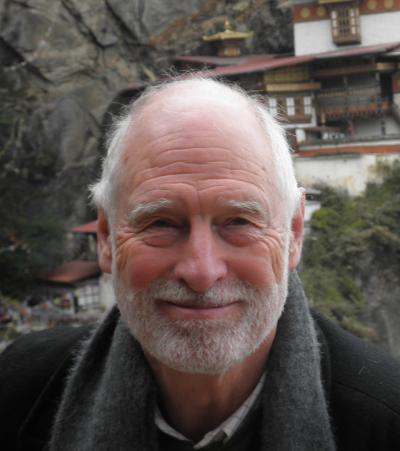
Adrian Atkinson 1943-2016: an Appreciation (Patrick Wakely)
Submitted by frankie on Sun, 2017-02-05 10:14.
Wakely 2022
The views expressed in 'Recent News & Reflections' are those of the author and do not necessarily reflect those of any of the governments, organisations or agencies with whom they have been working.

|
Professor Adrian Atkinson, who disappeared, presumed drowned, in April 2016 while swimming in Lake Geneva, was an environmental researcher, teacher and practitioner, strongly committed to environmental sustainability and the conservation of natural resources, biodiversity and the rationalisation of the use of energy, with an emphasis on urban centres and regions. He was an active member of DPU-Associates and a frequent contributor to the website, from its inception in 2008.
Much of his childhood was spent in Germany, where his father was principal of an international Rudolf Steiner School. He graduated as an architect at the Architectural Association School of Architecture (AA), London in 1969 and gained a Master of Architecture and Urban Planning from Princeton University, New Jersey, USA in 1974 and a PhD from the London School of Economics and Political Science (LSE), London in 1988.
For many years he worked with international agencies, national and local governments, NGOs and CBOs. He also maintained academic positions from the late 1970s to his appointment as Professor in Planning in the International Context at the Institute for Urban and Regional Planning of the Technical University Berlin, a position that he held from 2003 to 2008. From 1983 to 1997 he was a Lecturer and then Senior Lecturer at the Development Planning Unit (DPU) in London and was an active member of DPU-Associates from its foundation in 2000. As consultant and teacher/trainer he had worked in over forty countries.
Most recently, he had undertaken project formulation and evaluation work on projects and programmes in the field of urban development and urban environmental planning and management and, in parallel, developed policy in the field of Local Economic Development (LED). The former included work for the European Commission formulating urban development projects for Vietnam, Somalia and Georgia. He was Team Leader of the mid-term evaluation of the AsiaUrbs programme of the EU and also evaluated a number of the programme’s projects. This work also took him to Jordan where he evaluated the GIZ contribution to the Wold Bank-funded Social Productivity Programme involving pilot projects in LED.
In 2000 he established an NGO, New Synergies in Development (www.newsynergies.ch) as a ‘think tank’ that concentrated on local economic development, climate change and the way forward towards an environmentally and socially sustainable economy.
In the 1990s and the beginning of the 21st Century, he worked closely with GIZ and the EU on developing their policies on urban environmental management, which included ‘backstopping’ projects in Nepal, Thailand, Vietnam and Indonesia in which participatory methods of local environmental planning were developed and for which he produced guidelines and teaching materials as well as policy documents.
At the time of his disappearance, Adrian and his wife, Julie Viloria, were living in Philippines, where they were permaculture farming as active exponents of an alternative sustainable lifestyle in the ‘Transition Movement’. They were planning to move back to Europe to continue these activities and lifestyle in the UK near Totnes, Devon, where Adrian had contacts in the Transition Movement (See the link to the piece on ‘The Transition Movement’ that Adrian wrote for the DPU-Associates website shortly before he disappeared).
Links to key writings by Adrian Atkinson:
• Local Employment in the Informal Economy: Course Guide (2001)
• Cities after Oil - Part 1 (2007)
• Cities after Oil - Part 2 (2007)
• Cities after Oil - Part 3 (2008)
• Regional planning in Vietnam (2007)
• Climate Change Policy, Energy and Cities (2010)
• Urban social reconstruction after oil (2012)
• The Future of Local Economic Development (2014)
• Asian urbanisation: the final dash seen through the case of Ho Chi Minh City (2015)
• The Transition Movement (2016)
